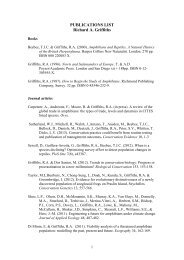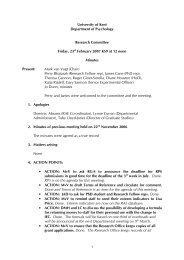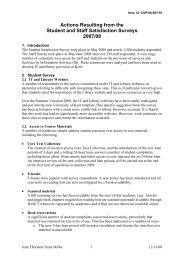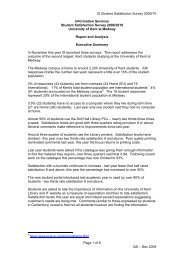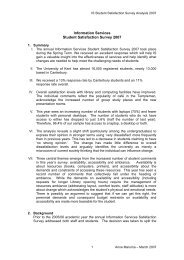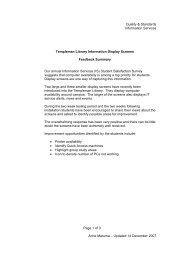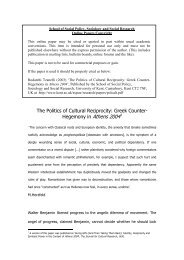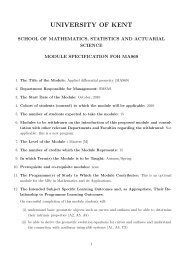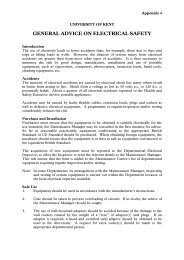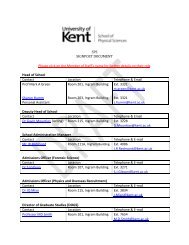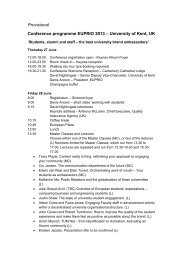Career Planning Guide for new graduates - University of Kent
Career Planning Guide for new graduates - University of Kent
Career Planning Guide for new graduates - University of Kent
Create successful ePaper yourself
Turn your PDF publications into a flip-book with our unique Google optimized e-Paper software.
<strong>Career</strong> <strong>Planning</strong> <strong>Guide</strong><br />
<strong>for</strong> <strong>new</strong> <strong>graduates</strong><br />
Support and help from the<br />
<strong>Career</strong>s and Employability Service<br />
at the <strong>University</strong> <strong>of</strong> <strong>Kent</strong> is<br />
still available after you graduate!
CONTENTS<br />
Introduction 2<br />
Your Options 3<br />
Making <strong>Career</strong> Choices 6<br />
Finding a Job<br />
Employers and Vacancies 7<br />
Graduate Internships 8<br />
Recruitment Agencies 10<br />
Networking 11<br />
Employability Skills 12<br />
Making Applications 14<br />
Interviews 15<br />
Further Study 16<br />
Time Out 17<br />
Working Abroad 18<br />
Volunteering Abroad 19<br />
<strong>Career</strong>s In<strong>for</strong>mation Resources 20<br />
<strong>Career</strong>s Advice after you Graduate 21
INTRODUCTION<br />
Congratulations on successfully graduating from the <strong>University</strong> <strong>of</strong> <strong>Kent</strong>!<br />
If you have a job or a postgraduate course fixed up already, even more<br />
congratulations – you can probably stop reading now!<br />
If you don’t yet have anything arranged, and maybe aren’t even sure what you want<br />
to do after you graduate, don’t worry – you are not alone and this booklet has been<br />
written to help you.<br />
The graduate job market continues to be highly competitive and there is a neverending<br />
flow <strong>of</strong> gloomy media reports about the difficulties facing <strong>new</strong> <strong>graduates</strong>.<br />
Don’t let these discourage you – and don’t use them as an excuse to do nothing<br />
about your career.<br />
While it’s true that there are more <strong>graduates</strong>, and fewer vacancies, than in the past,<br />
many employers tell us that they are receiving far fewer applications than they<br />
expected! Not only that, but even employers that receive high numbers <strong>of</strong><br />
applications still experience a shortage <strong>of</strong> applicants with the right skills.<br />
The destinations <strong>of</strong> <strong>Kent</strong> <strong>graduates</strong> in 2012 are encouraging, with less than 6% <strong>of</strong><br />
<strong>graduates</strong> still seeking employment six months after graduating - a lower level <strong>of</strong><br />
unemployment than the figures <strong>for</strong> UK universities as a whole.<br />
You can improve your chances <strong>of</strong> finding the job that you want by enhancing your<br />
range <strong>of</strong> skills, researching your career options and networking to develop your<br />
knowledge <strong>of</strong> career areas and opportunities. Your degree alone will not be enough<br />
to help you stand out from all the other <strong>graduates</strong>: it is everything else that you have<br />
to <strong>of</strong>fer on top <strong>of</strong> your academic qualifications (including your enthusiasm and<br />
motivation) that will do this.<br />
The rest <strong>of</strong> this booklet looks at the main options <strong>for</strong> <strong>new</strong> <strong>graduates</strong>: employment<br />
(permanent or temporary); further study and time out. It also includes a brief outline<br />
<strong>of</strong> resources, from the <strong>Career</strong>s & Employability Service and elsewhere, that will help<br />
you in your career planning and job search, including some <strong>of</strong> the current initiatives<br />
to help <strong>graduates</strong> find their first role.<br />
With best wishes <strong>for</strong> the future from all the <strong>University</strong> <strong>of</strong> <strong>Kent</strong> careers and<br />
employability advisers<br />
2
YOUR OPTIONS<br />
Employment<br />
Graduate jobs<br />
Most <strong>graduates</strong> will be aiming at a ‘graduate job’ – but what exactly is it?<br />
You may be thinking <strong>of</strong> a ‘graduate training scheme’;<br />
You may want to enter a ‘traditional’ pr<strong>of</strong>ession, such as teaching or law;<br />
You may want a job where you can make use <strong>of</strong> your degree subject directly;<br />
You may just want a job that requires a degree <strong>for</strong> entry and recognises the<br />
ef<strong>for</strong>t that you have put in to achieving one over the last three or four years!<br />
All <strong>of</strong> the above count as ‘graduate jobs’ – but so do many others. While a ‘graduate<br />
job’ is generally thought <strong>of</strong> as one where a degree is one <strong>of</strong> the essential selection<br />
criteria, this covers a very broad range <strong>of</strong> occupations. Graduates work in all kinds<br />
<strong>of</strong> roles, especially at the start <strong>of</strong> their career, and some very popular career areas,<br />
such as the media, have traditionally required <strong>graduates</strong> to be prepared to ‘start at<br />
the bottom’ to build up experience and contacts.<br />
Today’s graduate job market is a more diverse and competitive graduate labour<br />
market than ever be<strong>for</strong>e. ‘Traditional’ graduate careers such as engineering,<br />
medicine and law are now just one part <strong>of</strong> a diverse range <strong>of</strong> careers, in some <strong>of</strong><br />
which (such as marketing, media and tourism) <strong>graduates</strong> would have been in the<br />
minority ten or twenty years ago. Part <strong>of</strong> the reason <strong>for</strong> this change is due to the<br />
increasing numbers <strong>of</strong> <strong>graduates</strong>, but the increasing pr<strong>of</strong>essionalisation <strong>of</strong> all kinds<br />
<strong>of</strong> work areas is also a major factor.<br />
The first job that you enter upon graduation may there<strong>for</strong>e be a useful stepping<br />
stone, or an opportunity to gain key transferable skills <strong>for</strong> your next job, rather than a<br />
permanent position.<br />
Graduate training schemes<br />
Graduate training schemes are typically <strong>of</strong>fered by larger employers in business,<br />
finance, IT, law, technology, engineering and the public sector. They are also<br />
available, although in much smaller numbers, in areas such as publishing, public<br />
relations and advertising.<br />
In most cases, <strong>graduates</strong> are recruited into a specific role, such as finance,<br />
marketing, human resources or IT. Although many employers recruit <strong>graduates</strong> in<br />
any degree subject, and will provide whatever training is necessary, <strong>graduates</strong> are<br />
recruited to do a real job and are expected to be able to take on responsibility<br />
quickly. As well as on-the-job training, the employer will usually support <strong>graduates</strong><br />
to study <strong>for</strong> relevant pr<strong>of</strong>essional qualifications.<br />
3
Some employers recruit <strong>graduates</strong> onto a ‘rotational’ management training<br />
programme, which comprises a series <strong>of</strong> short placements (usually four to six<br />
months) in different departments or job functions. At the end <strong>of</strong> the programme<br />
<strong>graduates</strong> can choose where they want to specialise.<br />
These schemes are popular with <strong>graduates</strong> because they generally <strong>of</strong>fer a<br />
structured training and development programme and good longer-term career<br />
opportunities. They also have a high pr<strong>of</strong>ile, being widely advertised in graduate<br />
directories such as Prospects, TARGET and the Times 100. In addition, employers<br />
<strong>of</strong>fering these programmes <strong>of</strong>ten promote them actively through recruitment fairs<br />
and campus presentations. However, only a minority <strong>of</strong> <strong>graduates</strong> actually start<br />
their career on one <strong>of</strong> these structured training schemes – more <strong>graduates</strong> will start<br />
their career in a ‘one-<strong>of</strong>f’ job that is not part <strong>of</strong> a large-scale training programme.<br />
While many employers advertise their graduate training schemes at the start <strong>of</strong> the<br />
academic year, and may have closing dates in December or January, others recruit<br />
on a year-round basis. Some employers will only start to recruit <strong>graduates</strong> at the<br />
end <strong>of</strong> the summer term, when they know that potential candidates are now going to<br />
be focused on job-seeking rather than study. Recent <strong>graduates</strong> are still eligible to<br />
apply <strong>for</strong> graduate schemes commencing a year or two after they graduate and are<br />
<strong>of</strong>ten positively encouraged to do so. If you have taken a year out to travel or to gain<br />
further work experience, even where this has no connection with your future career,<br />
you will <strong>of</strong>ten find it easier to demonstrate the skills and motivation that employers<br />
want from <strong>graduates</strong>.<br />
Other graduate opportunities<br />
The majority <strong>of</strong> <strong>graduates</strong> will find their first role outside a <strong>for</strong>mal ‘graduate training<br />
scheme’. These other opportunities may include:<br />
<br />
<br />
<br />
Opportunities with small and medium-sized employers (SMEs)<br />
‘One-<strong>of</strong>f’ jobs with larger organisations, where candidates with a degree are<br />
required, or preferred, <strong>for</strong> this specific role<br />
Specialist positions such as economist, psychologist or research scientist<br />
- and may combine two or more <strong>of</strong> all the above!<br />
These posts may arise at any time <strong>of</strong> the year.<br />
There are many benefits <strong>for</strong> a graduate working <strong>for</strong> an SME. Smaller organisations<br />
<strong>of</strong>fer variety, early responsibility and the opportunity to work on your own initiative:<br />
you are also likely to work more closely with a wide range <strong>of</strong> employees, which<br />
gives you a wider exposure to other job roles, including senior management. All this<br />
provides an increased insight into how the business is run overall and gives you a<br />
better view <strong>of</strong> the organisation as a whole. In a smaller business you are an<br />
individual rather than one <strong>of</strong> dozens – even hundreds - <strong>of</strong> <strong>graduates</strong> on a<br />
management scheme, so if you per<strong>for</strong>m well you will be noticed: a survey by the<br />
Association <strong>of</strong> Graduate Recruiters found that <strong>graduates</strong> not on training schemes<br />
were more likely to have been promoted to junior management level, developing<br />
faster and were being assigned more responsibility than those who were!<br />
4
Temporary jobs<br />
Many <strong>graduates</strong> take a job that they see as temporary <strong>for</strong> various reasons:<br />
to try out a career area be<strong>for</strong>e making a decision;<br />
<br />
<br />
to gain experience that will help you into a permanent job or a postgraduate<br />
course (such as social work or librarianship) that requires relevant practical<br />
experience;<br />
to earn money to fund travel or further study - or just to live on!<br />
These jobs may be temporary in the sense that they are fixed-term contracts but, in<br />
many cases, they are only temporary in the eyes <strong>of</strong> the graduate who is doing the<br />
job! There is a great variety <strong>of</strong> ‘temporary jobs’, from those that require the same<br />
level <strong>of</strong> skills and qualifications as permanent graduate jobs to the same type <strong>of</strong><br />
‘casual’ work that most students do as part-time or vacation work. All <strong>of</strong> these can<br />
help you to build up the skills that employers look <strong>for</strong> in <strong>graduates</strong> (see page 12).<br />
Many employers are now <strong>of</strong>fering graduate internships – see page 8 <strong>for</strong> more<br />
details about what these involve and how to find out about them.<br />
If you are looking <strong>for</strong> temporary work, <strong>for</strong> whatever reason, don’t just restrict yourself<br />
to jobs that are advertised on a fixed-term contract as this will limit your<br />
opportunities. Most employers will not require more than one month’s notice and, if<br />
you have worked <strong>for</strong> them <strong>for</strong> six months to a year, this is unlikely to be viewed by<br />
other employers as ‘job-hopping’. You may even find that a job which you see as<br />
temporary when you take it up can <strong>of</strong>fer a level <strong>of</strong> interest and career development<br />
opportunities that will make you want to stay with it!<br />
Further study<br />
This does not just mean postgraduate degrees, but can also include vocational and<br />
practical skills training: <strong>for</strong> some career areas, this may be more relevant than a<br />
Masters degree!<br />
You can return to university <strong>for</strong> postgraduate study at any stage <strong>of</strong> your career –<br />
you don’t have to start a postgraduate degree immediately after completing your<br />
Bachelors degree. Increasingly, <strong>graduates</strong> are working <strong>for</strong> a year or two after they<br />
graduate to fund their future postgraduate study .<br />
For more in<strong>for</strong>mation about opportunities <strong>for</strong> further study, see page 16.<br />
Time Out<br />
Taking time out after your studies doesn’t mean putting your feet up after all your<br />
hard work. There are many opportunities to gain further experience, improve your<br />
confidence and skills and enhance your CV. These can include temporary jobs,<br />
casual work, travel, volunteering or a combination <strong>of</strong> all these – and more!<br />
As you see, you have many options and, in the present climate, it is important <strong>for</strong><br />
<strong>graduates</strong> to be flexible, consider all the opportunities available and to have a backup<br />
plan (maybe more than one). Your first job after graduating, whatever it is, will<br />
only be the starting point <strong>for</strong> your long-term career.<br />
5
MAKING CAREER CHOICES<br />
If you have finished your degree but still don’t know what you want to do as a<br />
career, don’t worry – many other <strong>graduates</strong> are in the same position.<br />
There are two key steps to making career decisions: thinking about yourself and<br />
investigating the career opportunities open to you.<br />
Thinking about yourself<br />
Start by thinking about two key questions:<br />
What do I want from a career? (what would give me job satisfaction?)<br />
What do I have to <strong>of</strong>fer employers? (what am I good at?)<br />
Our Choosing a <strong>Career</strong> web pages www.kent.ac.uk/careers/Choosing/<br />
Choosing<strong>Career</strong>.htm include exercises to help you analyse your interests, values,<br />
personal style and skills.<br />
Personality Questionnaires Understanding your personality, and its effect on<br />
your behaviour and interests, can help in choosing a career. The Myers Briggs<br />
Type Indicator (MBTI) is an assessment tool that is widely used in personal<br />
development and career planning. The MBTI looks at your preferred ways <strong>of</strong><br />
interacting with others, taking in in<strong>for</strong>mation, making decisions and working. A selfassessment<br />
exercise based on the MBTI is available online at<br />
www.humanmetrics.com/cgi-win/jtypes2.asp. While this site does have a section<br />
relating personality types to careers, there is a better careers guide at<br />
www.personalitypage.com/careers.html<br />
My Prospects <strong>Career</strong> Planner www.prospects.ac.uk/links/Pplanner is a powerful<br />
program to help you choose a career. It allows you to answer questions about your<br />
values and interests and then to relate these to a database <strong>of</strong> hundreds <strong>of</strong> graduatelevel<br />
occupations to get in<strong>for</strong>mation about career opportunities that may be worth<br />
investigating.<br />
Investigating your opportunities<br />
<br />
<br />
<br />
Our “What Can I Do with my Degree?” pages at www.kent.ac.uk/careers/<br />
degreein.htm will give ideas <strong>for</strong> careers where you may be able to use your<br />
degree directly, or where employers are particularly interested in <strong>graduates</strong><br />
in your subject. You will also find in<strong>for</strong>mation about careers entered by past<br />
<strong>Kent</strong> <strong>graduates</strong> in your subject.<br />
The “Options with your Subject” pages at www.prospects.ac.uk/<br />
options_with_your_subject.htm also <strong>of</strong>fer a range <strong>of</strong> ideas on how to use<br />
your degree. Don’t <strong>for</strong>get, though, that many careers will be open to<br />
<strong>graduates</strong> in any degree subject, so your opportunities are very wideranging.<br />
“I Want To Work In ….” www.kent.ac.uk/careers/workin.htm These pages<br />
give short introductions to over 100 popular graduate career areas, with<br />
links to sources <strong>of</strong> further in<strong>for</strong>mation.<br />
6
FINDING A JOB<br />
Employers and Vacancies<br />
The following sites are good sources <strong>of</strong> vacancies targeted on <strong>new</strong> or recent<br />
<strong>graduates</strong>. Most <strong>of</strong> them have a free vacancy alert service <strong>for</strong> registered users.<br />
<br />
<br />
<br />
<br />
<br />
<br />
<br />
The <strong>Career</strong>s & Employability Service’s vacancy<br />
database lists all vacancies <strong>for</strong> <strong>graduates</strong> sent to<br />
us directly by recruiters, including voluntary work,<br />
internships and gap year opportunities. These<br />
vacancies are with a variety <strong>of</strong> employers, small<br />
and large: some <strong>of</strong> them are based in <strong>Kent</strong> but<br />
most are with employers throughout the UK - and<br />
also abroad.<br />
www.kent.ac.uk/ces/vacancies.html<br />
RSS vacancy feed on Twitter www.twitter.com/unikentces<br />
Prospects www.prospects.ac.uk/graduate_job_search.htm<br />
TARGET Jobs http://targetjobs.co.uk<br />
Milkround www.milkround.co.uk<br />
Grad Jobs www.gradjobs.co.uk<br />
GradPlus www.gradplus.com<br />
Give a Grad a Go www.giveagradago.com<br />
The above are national resources which chiefly focus on large corporate and public<br />
sector recruiters. If you are interested in working locally (where there are few such<br />
recruiters), working in media or the arts, or working <strong>for</strong> a smaller employer, the<br />
following may help you:<br />
<br />
<br />
<br />
<br />
<br />
Occupational Pr<strong>of</strong>iles at www.prospects.ac.uk/types_<strong>of</strong>_jobs.htm. These<br />
cover over 400 different types <strong>of</strong> jobs, in all fields <strong>of</strong> work, and include<br />
vacancy sources.<br />
“I Want to Work In …” www.kent.ac.uk/careers/workin.htm - brief<br />
introductions to over 100 popular career areas, with useful links.<br />
Working in <strong>Kent</strong> www.kent.ac.uk/careers/kentopps.htm<br />
Working in Small Businesses www.kent.ac.uk/careers/sme.htm<br />
The Creative <strong>Career</strong> Search www.kent.ac.uk/careers/sk/CJ.htm<br />
7
Internships<br />
Internships are short-term, career-related posts which typically last around three to<br />
six months. All kinds <strong>of</strong> employers <strong>of</strong>fer internships, from large companies to small<br />
businesses and from government departments to charities. They <strong>of</strong>fer a good way to<br />
gain initial experience or to try out a career area that interests you, but there are<br />
many issues surrounding payment <strong>for</strong> these internships.<br />
While many internships are paid at least at the national minimum wage rate, a<br />
number <strong>of</strong> employers <strong>of</strong>fer unpaid internships. Although some <strong>of</strong> these, eg some<br />
internships with charities, are exempt from minimum wage legislation, many are in<br />
effect illegal. There is increasing concern that many organisations are breaking the<br />
law and exploiting individual <strong>graduates</strong> through unpaid internships. Another issue is<br />
that, since the majority <strong>of</strong> <strong>graduates</strong> who can af<strong>for</strong>d to take up unpaid internships<br />
are from wealthier backgrounds, these internships contribute towards restricted<br />
social mobility.<br />
Sites such as Interns Anonymous and Rights <strong>for</strong> Interns (below) provide further<br />
in<strong>for</strong>mation as to which internships can lawfully be <strong>of</strong>fered on an unpaid basis.<br />
Completing an internship with any organisation does not guarantee you a<br />
permanent job there (although some interns do get taken on at the end <strong>of</strong> their<br />
internship) but will give you invaluable experience <strong>for</strong> your CV.<br />
Useful resources <strong>for</strong> finding internships:<br />
The Graduate Talent Pool http://graduatetalentpool.direct.gov.uk<br />
This is a partnership between Government and employers, designed to help <strong>new</strong><br />
and recent <strong>graduates</strong> gain real work experience through internships in business,<br />
finance, the media, charities, the public sector, IT, manufacturing and many other<br />
sectors. Almost two-thirds <strong>of</strong> internships advertised are paid positions: the majority<br />
<strong>of</strong> the other posts will cover expenses.<br />
Graduate STEP www.step.org.uk/step_graduate.aspx<br />
2-3 month internships <strong>of</strong>fering meaningful, paid work <strong>for</strong> recent <strong>graduates</strong>.<br />
Inspiring Interns www.inspiringinterns.com graduate internships, jobs and work<br />
placements, mostly based in and around London. The site also includes advice, a<br />
blog and live chat.<br />
Interns Anonymous http://internsanonymous.co.uk Set up by two <strong>graduates</strong> as a a<br />
<strong>for</strong>um <strong>for</strong> interns to share their experiences and discuss the contentious issue <strong>of</strong><br />
unpaid employment.<br />
Rights <strong>for</strong> Interns www.rights<strong>for</strong>interns.org.uk - advice on your rights at work as an<br />
intern from the TUC.<br />
8
Knowledge Transfer Partnerships<br />
Knowledge Transfer Partnerships (KTPs) are not, strictly speaking, internships as,<br />
although they are fixed-term, they can last <strong>for</strong> up to three years. A KTP is a threeway<br />
partnership between a graduate, an employer and an educational institution,<br />
where the graduate works on a project <strong>for</strong> their employer while receiving further<br />
training and development – <strong>of</strong>ten leading to a postgraduate degree. KTP has<br />
worked with over 3,000 organisations from micro-sized to large businesses such as<br />
Unilever and Rolls-Royce and any degree subject is considered. For full in<strong>for</strong>mation,<br />
and current KTP vacancies, see www.ktponline.org.uk<br />
Graduate <strong>Career</strong>s Fairs<br />
These fairs give recent <strong>graduates</strong>, as well as current students, the chance to meet<br />
graduate recruiters and get in<strong>for</strong>mation from them about their career opportunities<br />
and graduate recruitment processes. They may be run by university careers services<br />
(some <strong>of</strong> these may restrict attendance to their own students and <strong>graduates</strong>)<br />
or by commercial exhibition organisers. They are held throughout the year and<br />
throughout the UK, but summer and autumn are the most popular times.<br />
These events are always very busy and you need to prepare <strong>for</strong> them in advance<br />
by:<br />
<br />
<br />
<br />
Researching the employers who will be there, the positions they are recruiting<br />
<strong>for</strong> and what they look <strong>for</strong> in <strong>graduates</strong><br />
Thinking <strong>of</strong> questions that you can ask these employers<br />
Preparing a CV that you can leave with the employers you have spoken to<br />
Most <strong>of</strong> the organisations attending these fairs will be the large corporate employers<br />
<strong>of</strong>fering graduate training schemes (see p. 3). The Fairs are not good huntinggrounds<br />
<strong>for</strong> <strong>graduates</strong> aiming at careers in the media, or other specialised sectors,<br />
or SMEs – see p. 11 <strong>for</strong> advice on targeting these recruiters through networking.<br />
The nearest summer fairs to <strong>Kent</strong> are those held in London, including:<br />
The Summer Graduate Fair<br />
5 June 2013, Olympia 2, London W14<br />
www.summergradfair.co.uk<br />
London Graduate Fair - The <strong>Career</strong>s Group and TARGETJobs.co.uk<br />
19/20 June 2013, Business Design Centre, Islington, London N1<br />
www.londongradfair.co.uk/summer<br />
For details <strong>of</strong> careers fairs at other times <strong>of</strong> year, and in other locations, see<br />
www.prospects.ac.uk/links/careerfairs<br />
9
Recruitment Agencies<br />
Recruitment agencies can be a useful part <strong>of</strong> your job search, whether <strong>for</strong> a<br />
permanent graduate job or a temporary position.<br />
Recruitment agencies are used by all kinds <strong>of</strong> employers, both large companies<br />
who wish to ‘spread their net’ as widely as possible when recruiting <strong>graduates</strong> and<br />
by smaller ones which do not have the personnel resources to carry out their own<br />
recruitment. The agencies advertise the jobs, take applications from candidates and<br />
carry out the preliminary selection. They also match up candidates on their<br />
database to vacancies received from employers.<br />
Frequently, employers expect agencies to put <strong>for</strong>ward candidates with specific<br />
qualities or abilities related to the job. This can restrict opportunities <strong>for</strong> <strong>new</strong><br />
<strong>graduates</strong> without significant work experience - some agencies specify six months<br />
experience in a relevant field.<br />
Do not use any agency that tries to charge you a fee: reputable agencies charge the<br />
employer, not the job-seeker.<br />
While the <strong>Career</strong>s & Employability Service does not recommend any agencies, the<br />
following may be useful starting points <strong>for</strong> <strong>new</strong> <strong>graduates</strong>:<br />
<br />
<br />
<br />
<br />
Graduate Recruitment Bureau www.grb.uk.com<br />
Reed Graduates www.reed.co.uk/jobs/graduate<br />
Brampton Staf<strong>for</strong>d Recruitment www.brampton-recruitment-4-graduatejobs.co.uk<br />
The Graduate Recruitment Company www.graduate-recruitment.co.uk<br />
There are also agencies that specialise in particular job sectors, such as computing<br />
and IT, sales, charities, finance, education, social care and jobs requiring language<br />
skills. Links to these can be found on the <strong>Career</strong>s & Employability Service web<br />
pages www.kent.ac.uk/careers/recruit.htm#specags<br />
A guide to recruitment agencies and online jobs boards, produced by the<br />
<strong>Career</strong>s Group, <strong>University</strong> <strong>of</strong> London, can be downloaded at:<br />
www.careers.lon.ac.uk/files/pdf/RecruitmentAgencies1011.pdf<br />
Don't rely on agencies alone to find you a job - you should also use our graduate<br />
vacancy database, other graduate directories and sites, such as those listed on<br />
page 7, and make direct approaches to employers<br />
10
Networking<br />
What is networking?<br />
Here is one definition:<br />
"Networking is making links from people we know<br />
to people they know, in an organized way, <strong>for</strong> a<br />
specific purpose"<br />
That purpose may be to get a job or to obtain in<strong>for</strong>mation. Networking is not simply<br />
a way <strong>of</strong> making potentially useful contacts: it can be used to help in your careers<br />
research and decision-making.<br />
At its simplest, networking is just talking to people! You may feel that, at the<br />
moment, there are no ‘people you know’ who are likely to be able to help you begin<br />
networking. But just start to think about all the people you do know – and all the<br />
people they might know. Remember the ‘six degrees <strong>of</strong> separation’ theory that any<br />
two individuals are linked by an average <strong>of</strong> six acquaintances.<br />
Here are just a few ideas <strong>for</strong> people who may be able to help you start a network:<br />
Fellow-students; your friends and relatives; friends <strong>of</strong> your relatives; relatives <strong>of</strong><br />
your friends; tutors and other academics; people you work with, or meet through<br />
your work; members <strong>of</strong> clubs and societies.<br />
If you start to tell everyone you know about your career plans, even at a very basic<br />
level such as “I’m trying to find a job in publishing”, sooner or later someone is likely<br />
to say something like “My friend’s brother works in publishing” giving you the<br />
chance to ask them to put you in touch with that person.<br />
You don’t have to make contacts through people you already know - anyone you<br />
meet – sitting on a train, at a concert or sporting event, in the pub - could be<br />
somebody who can help you in your creative career search.<br />
And you don’t have to restrict yourself to people you meet in person – online<br />
networking can be used <strong>for</strong> careers research, job seeking and to market yourself to<br />
future employers as well as sorting out your social life. There are different sites <strong>for</strong><br />
pr<strong>of</strong>essional networking and <strong>for</strong> social networking – your Facebook pr<strong>of</strong>ile may not<br />
present you to employers in the best possible light!<br />
LinkedIn www.linkedin.com is a business-oriented social networking site that<br />
provides opportunities to network online with pr<strong>of</strong>essionals from all kinds <strong>of</strong> different<br />
employment sectors, as well as past <strong>Kent</strong> alumni.<br />
Further in<strong>for</strong>mation on networking<br />
The Creative <strong>Career</strong> Search www.kent.ac.uk/careers/sk/CJ.htm<br />
Beginner’s <strong>Guide</strong> to Networking https://nationalcareersservice.direct.gov.uk/<br />
advice/getajob/howt<strong>of</strong>indajob/Pages/networking.aspx<br />
11
EMPLOYABILITY SKILLS:<br />
what do employers want?<br />
Employability skills have been defined as:<br />
"A set <strong>of</strong> achievements, understandings and personal attributes that make<br />
individuals more likely to gain employment and to be successful in their chosen<br />
occupations".<br />
Employers look <strong>for</strong> a range <strong>of</strong> these skills in graduate applicants, many <strong>of</strong> which are<br />
common to a number <strong>of</strong> different career areas. They vary only slightly between<br />
different careers and employers and almost always include:<br />
Interpersonal Skills – how well do you communicate with people? Can you<br />
listen, persuade, advise and communicate your ideas clearly? Can you speak<br />
confidently in front <strong>of</strong> an audience?<br />
Written Communication Skills Can you write clearly and concisely? Can you<br />
use the written word to communicate accurate in<strong>for</strong>mation to a reader who<br />
may not have a specialist knowledge <strong>of</strong> the subject?<br />
Self-Motivation – how proactive are you? Can you work without supervision?<br />
Are you determined and enthusiastic?<br />
Analytical ability – can you analyse complex in<strong>for</strong>mation and pick out the key<br />
issues?<br />
Decision-making Can you make challenging decisions under pressure?<br />
Team working – can you be part <strong>of</strong> a team working towards a common goal<br />
and not only play your part but support others?<br />
Flexibility – can you handle the change and uncertainty <strong>of</strong> the modern<br />
workplace? Are you flexible about how, when and where you work?<br />
Organisation, <strong>Planning</strong> & Prioritisation – can you manage your tasks and<br />
your time effectively, even under pressure?<br />
Problem-solving and initiative – can you solve problems and overcome<br />
difficulties? Can you think creatively and laterally in order to come up with <strong>new</strong><br />
ideas and solutions?<br />
Leadership ability – can you guide, direct and motivate others?<br />
Resilience – can you cope with long hours, deadlines, early starts and<br />
pressure to per<strong>for</strong>m or meet targets?<br />
Commercial Awareness & Customer Focus – do you understand the<br />
market in which your company operates? Are you able to work with clients to<br />
ensure their satisfaction?<br />
There are also the essential job-hunting skills: the ability to put yourself over<br />
effectively in writing (i.e. in your application) and in person (at interview) and to<br />
per<strong>for</strong>m well in the various selection processes that employers use to assess your<br />
employability skills.<br />
As well as application <strong>for</strong>ms and interviews, these processes include psychometric<br />
tests (usually to assess your verbal and numerical reasoning skills) and assessment<br />
centres.<br />
12
What are my skills?<br />
This may all seem scary, but it’s important to realise that most <strong>new</strong> <strong>graduates</strong> have<br />
already developed these employability skills through their studies, work experience<br />
and extra-curricular activities. You now need to relate these skills to the careers and<br />
jobs which interest you and to demonstrate them successfully to employers. Our<br />
Employability Skills web pages www.kent.ac.uk/careers/sk/skillsmenu.htm can help<br />
you to do this.<br />
Our pages on competency-based applications and interviews www.kent.ac.uk/<br />
careers/compet/skillquest.htm give advice on how to use these skills in applications<br />
<strong>for</strong> graduate jobs<br />
This ‘skills map’ sets out the main employability skills in a way that shows their<br />
relationships to each other. You may wish to highlight any you feel you are good at<br />
and put a question mark against any you feel you need to develop. Does a pattern<br />
emerge? Try and think <strong>of</strong> examples <strong>of</strong> times and situations where you have used<br />
your highlighted skills: these can then be used in your CV or application <strong>for</strong>ms.<br />
13
MAKING APPLICATIONS<br />
Completing an application <strong>for</strong>m, or composing a good CV, is the hardest part <strong>of</strong> the<br />
application process: <strong>of</strong>ten, 90% <strong>of</strong> candidates will be rejected at this stage. If you<br />
have already made unsuccessful applications <strong>for</strong> graduate jobs, it is worth reviewing<br />
your technique and making sure that you are putting yourself over as effectively as<br />
possible.<br />
Our web pages www.kent.ac.uk/careers/applicn.htm include example CVs, covering<br />
letters and application <strong>for</strong>ms <strong>for</strong> a number <strong>of</strong> different career areas, as well as the<br />
following general in<strong>for</strong>mation, advice and tips:<br />
APPLICATION FORMS<br />
How to complete application <strong>for</strong>ms<br />
<br />
<br />
How to deal with competency-based questions. These are the tough ones<br />
beginning "Give an example ..." or "Describe a situation ..."<br />
Applications <strong>for</strong> postgraduate study including personal statements<br />
CURRICULUM VITAEs (CVs) AND COVERING LETTERS<br />
How to write a CV<br />
<br />
<br />
<br />
Common questions about CVs<br />
Different <strong>for</strong>mats <strong>of</strong> CV<br />
How to write a covering letter<br />
PLUS …<br />
<br />
<br />
<br />
Action verbs. Using positive verbs in your application can make a stronger<br />
impression<br />
Spelling and punctuation test. Don’t let poor spelling or grammar spoil<br />
your chances!<br />
Psychometric tests with examples to practise<br />
The <strong>Career</strong>s and Employability Advisers are happy to look over your CV and/or<br />
application <strong>for</strong>m and give you tips on how to improve them. This is easiest to do<br />
face-to-face, but we can give help by email if it is not possible <strong>for</strong> you to visit us in<br />
person.<br />
14
INTERVIEWS<br />
Getting an interview is an achievement in itself. Only a small minority <strong>of</strong> applicants<br />
are selected <strong>for</strong> interview, so you have already made a positive impression to have<br />
got to this stage. Below you will find some advice, tips and resources to help you<br />
make the most <strong>of</strong> this opportunity.<br />
The purpose <strong>of</strong> the interview<br />
Essentially, it is <strong>for</strong> the interviewer to see if you match the requirements <strong>of</strong> the job.<br />
These will naturally vary with different jobs but are likely to include:<br />
<br />
<br />
<br />
Your personal qualities<br />
How well you express yourself<br />
Your motivation and enthusiasm<br />
It is also your chance to meet somebody from the organisation and assess them:<br />
are they <strong>of</strong>fering what you want?<br />
There aren't any right or wrong answers to interview questions: how you come<br />
across is as important as what you say.<br />
Thorough preparation is the key to success: research the career area and the<br />
employer to which you are applying; think <strong>of</strong> questions that they might ask you and<br />
plan your answers. This will help you to appear confident at interview (however<br />
nervous you feel inside!) and provide evidence <strong>of</strong> your motivation and enthusiasm.<br />
Useful sources <strong>of</strong> in<strong>for</strong>mation and help<br />
<strong>Career</strong>s & Employability Service web pages on interviews:<br />
www.kent.ac.uk/careers/intervw.htm These include hints on the questions<br />
you might be asked, and how to handle them, questions you might ask the<br />
interviewer, advice on preparing <strong>for</strong> interview and feedback from past <strong>Kent</strong><br />
<strong>graduates</strong> on their interview experiences.<br />
<br />
<br />
The <strong>Career</strong>s & Employability Service booklet, “Interview Skills”, covers<br />
many <strong>of</strong> the same topics in a handy pocket-sized booklet.<br />
“Why ask me That?” is a DVD which gives an insight into the interviewer’s<br />
mind and what s/he is looking <strong>for</strong> in candidates. This can be viewed online<br />
at www.kent.ac.uk/careers/IntVid.htm using your <strong>Kent</strong> login.<br />
15
FURTHER STUDY<br />
Further academic study<br />
Even at this late stage, many universities still have places available <strong>for</strong><br />
postgraduate study starting in September – but don’t just drift into a postgraduate<br />
course without thinking about what you hope to gain from it and how it will benefit<br />
you in the longer term.<br />
Our Postgraduate Study web pages www.kent.ac.uk/ces/postgrad-study.html<br />
include advice on these issues plus links to a wide range <strong>of</strong> sites including<br />
databases <strong>of</strong> postgraduate opportunities.<br />
Other areas <strong>of</strong> study<br />
IT and <strong>of</strong>fice skills, particularly databases and spreadsheets, are important in<br />
almost any career area. The European Computer Driving Licence www.ecdl.com is<br />
a good way to develop these and other IT skills.<br />
Driving is another useful skill, opening up jobs that require travel or are located in<br />
hard-to-reach areas so, if you don’t yet have a full licence, it is worth trying to<br />
achieve this as soon as possible. Many driving schools <strong>of</strong>fer student discounts, so<br />
sign up be<strong>for</strong>e your student card expires!<br />
Languages are always useful and brushing up on your rusty GCSE French,<br />
through an organised course or through self-study, could be valuable. Another way<br />
to improve your language skills is through working or travelling abroad (see pages<br />
17-18) which could also give you the chance to pick up a basic knowledge <strong>of</strong> a<br />
more unusual language.<br />
Numeracy is important <strong>for</strong> many careers but a skill that many <strong>graduates</strong> feel that<br />
they lack! If you have a low GCSE grade in Maths, or just want to improve your<br />
numeracy skills, retaking your GCSE, or taking a course such as the Open<br />
<strong>University</strong>’s “Starting with Maths” (course code Y182) would be worthwhile.<br />
Business and finance courses can help you to build up the skills and knowledge<br />
needed <strong>for</strong> a specific career area, or just to develop commercial awareness that<br />
graduate employers look <strong>for</strong>. These courses could include, <strong>for</strong> example, the<br />
Foundation Award in Public Relations www.cipr.co.uk/qualifications, the Certificate<br />
in Finance, Accounting & Business www.icaew.com/cfab or Open <strong>University</strong><br />
modules in Business and Management www.open.ac.uk<br />
Teaching English as a Foreign Language (TEFL) If you want to teach English<br />
abroad, a recognised qualification will open up more opportunities. The CELTA or<br />
TrinityCertTESOL certificates are not cheap but they are recognised throughout the<br />
world, so taking a cheaper but unrecognised course could be false economy. For<br />
more about TEFL qualifications and courses see www.kent.ac.uk/careers/tefl.htm<br />
Local colleges <strong>of</strong> further education <strong>of</strong>fer a range <strong>of</strong> vocational courses, <strong>of</strong>ten<br />
through part-time study. Most courses will begin at the start <strong>of</strong> the <strong>new</strong> academic<br />
year in early September, but some colleges <strong>of</strong>fer short courses over the summer.<br />
Fees are usually reduced if you are unwaged. Distance learning is another option.<br />
See www.kent.ac.uk/careers/distance.htm <strong>for</strong> links to sites covering part-time<br />
courses in any part <strong>of</strong> the country and also courses <strong>of</strong>fered by distance learning.<br />
16
TIME OUT<br />
Many students think <strong>of</strong> ‘taking a year out’ after they graduate, but this needs to be<br />
carefully planned. Otherwise, you run the risk <strong>of</strong> spending a year stuck in an<br />
unchallenging job (or series <strong>of</strong> jobs), gaining little in the way <strong>of</strong> skills, experience or<br />
satisfaction. The resources listed below will help you to avoid this trap, but first a<br />
couple <strong>of</strong> questions to ask yourself:<br />
Why do you want to take time out?<br />
To earn some money to pay <strong>of</strong>f your debts?<br />
<br />
<br />
<br />
<br />
To travel?<br />
To decide on a career?<br />
To gain some relevant work experience?<br />
A bit <strong>of</strong> all the above?<br />
What can you do?<br />
Almost anything! but these are some <strong>of</strong> the most popular options:<br />
join an organised project<br />
<br />
<br />
<br />
find your own job or internship<br />
travel independently, working as you go<br />
follow a course to improve your skills or develop an interest<br />
What will future employers think?<br />
"Most recruiters look favourably upon people who have taken gap years, if they are<br />
able to draw on their experiences and show an employer how they might make<br />
them more effective in the role they are applying <strong>for</strong>" (Carl Gilleard, Association <strong>of</strong><br />
Graduate Recruiters)<br />
"When looking <strong>for</strong> jobs I found it very easy to handle the questions on employers'<br />
application <strong>for</strong>ms as I had gained so many skills from my gap year teaching English<br />
in China: teamworking, initiative, problem-solving and leadership to name just a<br />
few"<br />
A lot will depend on what you have done during a gap year and how you present it.<br />
If you have spent a year backpacking around the world, your applications should<br />
show how you planned and organised the trip; how you dealt with any problems you<br />
met along the way, how you funded it and what you learned from the experience,<br />
rather than just listing all the exotic countries you visited.<br />
Employers, though, are usually even more impressed if you have gained some<br />
rather more structured experience, through paid work or through volunteering,<br />
during a gap year. The following pages outline a few <strong>of</strong> the ways in which you can<br />
do this.<br />
For further in<strong>for</strong>mation and ideas, visit www.kent.ac.uk/careers/alternatives.htm<br />
17
WORKING ABROAD<br />
– INTERNSHIPS AND WORKING HOLIDAYS<br />
Traineeships in the EU institutions<br />
If you speak another European language to at least A-level standard, you could<br />
apply <strong>for</strong> a five-month traineeship (also known as a stage – pronounced starge) in<br />
one <strong>of</strong> the European Union institutions. Stages begin in October and March each<br />
year, and you need to apply six months in advance. Trainees receive a living<br />
allowance and can be involved in a variety <strong>of</strong> work related to European affairs. For<br />
further in<strong>for</strong>mation, see http://ec.europa.eu/stages/<br />
Leonardo da Vinci Programme<br />
This <strong>of</strong>fers 10-week internships in another European country. The programme is<br />
funded by the EU and includes travel, accommodation, support and mentoring.<br />
Internships are available in a number <strong>of</strong> areas, including business, IT, media, retail,<br />
teaching, travel and tourism. For further details, see www.workandvolunteer.com/<br />
leonardo<br />
BUNAC - Work Canada<br />
This programme helps UK <strong>graduates</strong> to find all kinds <strong>of</strong> seasonal jobs (outdoor jobs,<br />
tourism jobs, ski jobs, resort jobs) or more career related working positions<br />
anywhere in Canada. Unlike candidates who apply independently <strong>for</strong> a working<br />
holiday visa, BUNAC candidates don’t need a written job <strong>of</strong>fer be<strong>for</strong>e you go to<br />
Canada. For full details, see www.bunac.org/uk/workcanada<br />
Working Holidays in Australia<br />
The Working Holiday Visa allows you to work <strong>for</strong> a total <strong>of</strong> 12 months in Australia<br />
(up to 6 months maximum with any one employer). You can do any kind <strong>of</strong> work,<br />
although most opportunities are in tourism, catering and agriculture, and you don’t<br />
need to have an <strong>of</strong>fer be<strong>for</strong>e you go.<br />
Full details at www.immi.gov.au/visitors/working-holiday/<br />
Au Pair Work<br />
Good experience <strong>for</strong> anyone interested in a teaching career. Au pairs are required<br />
to be given time <strong>of</strong>f from their childcare responsibilities to attend language classes,<br />
so this can also be a way to develop your language skills (although au pair work is<br />
also available in Australia, Canada, New Zealand and the USA). The British Au Pair<br />
Agencies Association www.bapaa.org.uk is a good starting point.<br />
Working in Ski Resorts<br />
If you love the white stuff, there are many jobs that will allow you to spend a whole<br />
season on the slopes. Most <strong>of</strong> these have nothing to do with skiing itself, but are<br />
based in hotels, bars and restaurants. However, you will get skiing time and some<br />
companies may also provide a lift pass among other perks. A site with a lot <strong>of</strong> good<br />
background in<strong>for</strong>mation, as well as job listings, is Natives www.natives.co.uk<br />
18
VOLUNTEERING ABROAD<br />
– WITHOUT SPENDING A FORTUNE<br />
Volunteering abroad is a great experience and a great way to improve your CV –<br />
especially if you hope to go into teaching, social work, healthcare, international<br />
development or conservation. Not many <strong>new</strong> <strong>graduates</strong>, though, can af<strong>for</strong>d the four<br />
-figure sums that many organisations charge to arrange a volunteer placement.<br />
Below, we list some that <strong>of</strong>fer similar opportunities <strong>for</strong> a more manageable cost.<br />
This does not necessarily mean that the placement will be lower-quality – many <strong>of</strong><br />
these organisations cut costs by working directly with the project organisers and<br />
cutting out intermediaries.<br />
Please note that the list below does not imply any recommendation <strong>of</strong> any<br />
organisation and you are recommended to investigate all opportunities<br />
carefully be<strong>for</strong>e applying. Be<strong>for</strong>e you commit yourself, make sure you know all<br />
about the project. For detailed advice on choosing a volunteer project and questions<br />
to ask, see www.ethicalvolunteering.org<br />
Prices quoted do not usually include travel and insurance costs.<br />
Volunteer Action <strong>for</strong> Peace: www.vap.org.uk 80 countries. Cost £150 - £190<br />
Concordia: www.concordia-iye.org.uk Projects in Europe, North America,<br />
North Africa, Japan and South Korea or Africa, Asia and Latin America. £150 -<br />
£300<br />
UNA Exchange: www.unaexchange.org “we are usually able to <strong>of</strong>fer projects<br />
in more than 50 countries each year”. Cost from £150 - £300<br />
Ecoteer www.ecoteer.com Ecoteer believe they are one <strong>of</strong> the very few true<br />
ethical and responsible volunteering companies. They have taken out the<br />
middle man and over 25% <strong>of</strong> their projects are free. If you do have to pay<br />
money you give it direct to the project.<br />
Independent Volunteer http://independentvolunteer.org focuses on projects<br />
and organisations that charge low or no fees other than reasonable food and<br />
accommodation costs.<br />
Volunteer Latin America www.volunteerlatinamerica.com Opportunities<br />
throughout Central and South America on projects ranging from helping street<br />
children to monitoring wildcats such as puma and ocelots. Costs range from<br />
approx. £50 – £250 per month.<br />
Volunteer South America www.volunteersouthamerica.net This site lists a<br />
large number <strong>of</strong> organisations <strong>of</strong>fering free and low-cost volunteer<br />
opportunities in South & Central America.<br />
100 Free or Cheap Volunteer Work Opportunities from the Overseas Jobs<br />
Centre<br />
www.overseasjobcentre.co.uk/100_free_volunteer_work_opportunities.shtml<br />
19
CAREERS INFORMATION RESOURCES<br />
<strong>Career</strong>s & Employability Service website www.kent.ac.uk/ces<br />
Our web pages hold in<strong>for</strong>mation about the facilities <strong>of</strong>fered by the <strong>Career</strong>s &<br />
Employability Service plus links to employers, pr<strong>of</strong>essional bodies, job vacancies<br />
and other careers websites.<br />
Some useful pages include:<br />
Vacancy database - a continually-updated, searchable database <strong>of</strong><br />
vacancies <strong>for</strong> final-year students and recent <strong>graduates</strong> plus sandwich<br />
placements and vacation work www.kent.ac.uk/ces/vacancies.html<br />
Working in <strong>Kent</strong> – includes the <strong>Kent</strong>Grads directory <strong>of</strong> local employers<br />
www.kent.ac.uk/careers/kentopps.htm<br />
I Want to Work In …. Short introductions to almost 100 popular career areas,<br />
with links to other useful sites www.kent.ac.uk/careers/workin.htm<br />
What Can I do with my Degree In ….? – some <strong>of</strong> the opportunities available<br />
with your degree subject, plus an overview <strong>of</strong> jobs and postgraduate study<br />
entered by past <strong>Kent</strong> <strong>graduates</strong> <strong>of</strong> this subject www.kent.ac.uk/careers/<br />
degreein.htm<br />
Alternatives – ethical careers, alternative work styles, time out and voluntary<br />
work www.kent.ac.uk/careers/alternatives.htm<br />
Postgraduate Study – www.kent.ac.uk/ces/postgrad-study.html<br />
Special Interest Groups – pages <strong>for</strong> students with disabilities, ethnic minority<br />
students, mature students, women students, international students and LGBT<br />
students are linked from www.kent.ac.uk/ces/special-interest.html<br />
Applications, interviews and aptitude tests including example CVs, practice<br />
interviews, reports from <strong>Kent</strong> students on interviews they have undergone,<br />
practice aptitude tests and much more www.kent.ac.uk/careers/applicn.htm<br />
OTHER USEFUL SITES<br />
Prospects.ac.uk<br />
This is the <strong>of</strong>ficial national graduate careers website and works in close partnership<br />
with higher education careers services . Prospects.ac.uk <strong>of</strong>fers a wide range <strong>of</strong><br />
career planning and job-seeking resources, including graduate job vacancies,<br />
occupational pr<strong>of</strong>iles and postgraduate study in<strong>for</strong>mation. www.prospects.ac.uk<br />
New Life Network www.<strong>new</strong>lifenetwork.co.uk <strong>Career</strong> management resource,<br />
originally set up to help those made redundant find a <strong>new</strong> job but now covering a<br />
wide range <strong>of</strong> in<strong>for</strong>mation, jobs and advice, including advice <strong>for</strong> students and<br />
<strong>graduates</strong> at<br />
www.<strong>new</strong>lifenetwork.co.uk/career-help-<strong>for</strong>-students-<strong>graduates</strong>-c58.html<br />
20
CAREERS ADVICE AFTER YOU GRADUATE<br />
<strong>Kent</strong> <strong>graduates</strong> are still welcome to use the <strong>Career</strong>s & Employability Service after<br />
graduation <strong>for</strong> in<strong>for</strong>mation, advice and guidance.<br />
Advice in person<br />
The <strong>Career</strong>s & Employability Service, at Canterbury and at Medway, is open as<br />
normal throughout the summer vacation so, if you are still living in the area, you can<br />
call in to see a careers adviser <strong>for</strong> either ‘drop-in’ advice or a longer careers<br />
guidance interview (see www.kent.ac.uk/ces/advice.html <strong>for</strong> details). For full details<br />
<strong>of</strong> our opening times see www.kent.ac.uk/ces/locations/index.html<br />
If you have left <strong>Kent</strong>, you can still get help and advice from us by phone or email.<br />
Advice by phone<br />
We can <strong>of</strong>fer telephone interviews to <strong>graduates</strong> – please phone first to book a time<br />
to talk to a careers adviser<br />
Phone: 01227 823299 (Canterbury); 01634 202983 (Medway and the Partner<br />
Colleges)<br />
Advice by email<br />
email careerhelp@kent.ac.uk <strong>for</strong> advice or use our online <strong>for</strong>m at www.kent.ac.uk/<br />
careers/email<strong>for</strong>m.html<br />
Advice from other careers services<br />
If you live some way from <strong>Kent</strong> but would like to talk with a careers adviser face-t<strong>of</strong>ace,<br />
you may be able to use the careers service at a university nearer your home.<br />
Most universities in the UK can <strong>of</strong>fer careers in<strong>for</strong>mation, advice and guidance to<br />
<strong>graduates</strong> <strong>of</strong> other universities: you can find details <strong>of</strong> your nearest university on<br />
the Prospects website http://bit.ly/eFFFQd These services are normally free <strong>of</strong><br />
charge (although you should always check first with the university you plan to visit).<br />
You should note that most universities based in London will not see <strong>graduates</strong> <strong>of</strong><br />
other universities or, if they do, will charge <strong>for</strong> their services. The <strong>University</strong> <strong>of</strong><br />
London, <strong>for</strong> example, requires <strong>graduates</strong> <strong>of</strong> other universities to join its ‘Grad Club<br />
UK’ (at a fee <strong>of</strong> £55 a year) if they want to use its careers in<strong>for</strong>mation resources,<br />
with a further charge <strong>for</strong> individual careers guidance.<br />
Further advice<br />
There is a page <strong>of</strong> advice and tips <strong>for</strong> recent <strong>graduates</strong> at www.kent.ac.uk/<br />
careers/services<strong>for</strong><strong>graduates</strong>.htm<br />
KEEP IN CONTACT WITH US!<br />
If you fill in our Contact Form at www.kent.ac.uk/careers/feedback<strong>for</strong>m.html we<br />
will be able to send you regular bulletins including vacancy updates, targeted<br />
vacancies <strong>for</strong> <strong>graduates</strong> in your subject and general job hunting in<strong>for</strong>mation after<br />
graduation. This will also entitle you to get careers help from us <strong>for</strong> up to three years<br />
after you leave <strong>Kent</strong>.<br />
@unikentemploy<br />
@ukmemploy<br />
www.facebook.com/ukces<br />
www.facebook.com/ukmemployability<br />
21
This booklet was designed, compiled and produced by the <strong>Career</strong>s and Employability Service <strong>of</strong> the<br />
<strong>University</strong> <strong>of</strong> <strong>Kent</strong>.<br />
It is updated annually and we would be grateful <strong>for</strong> any suggestions to improve the next edition.<br />
Please send these to B.E.Woodcock@kent.ac.uk<br />
© Copyright 2013 <strong>University</strong> <strong>of</strong> <strong>Kent</strong> <strong>Career</strong>s and Employability Service<br />
Any advice or in<strong>for</strong>mation contained in this booklet is supplied in good faith and is accurate to the<br />
best <strong>of</strong> our knowledge and belief. However, the <strong>Career</strong>s & Employability Service (CES) has no<br />
responsibility or liability with respect to any loss or damage that may arise from the advice or<br />
in<strong>for</strong>mation or the use <strong>of</strong> it. This booklet includes references to websites that are not under the<br />
control <strong>of</strong> the CES or the <strong>University</strong> <strong>of</strong> <strong>Kent</strong>. The CES has no control over and will accept no<br />
responsibility or liability <strong>for</strong> material on other websites.<br />
No part <strong>of</strong> this publication may be copied or reproduced, stored in a retrieval system or transmitted<br />
in any <strong>for</strong>m or by any means electronic, mechanical photocopy, recording or otherwise without the<br />
prior permission <strong>of</strong> the <strong>University</strong> <strong>of</strong> <strong>Kent</strong> <strong>Career</strong>s and Employability Service.<br />
114948



